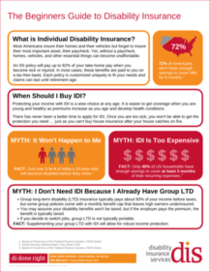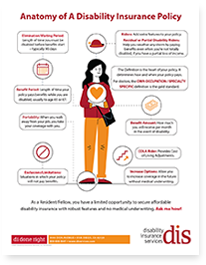A little knowledge is a powerful thing. People who don’t understand disability insurance are unlikely to spend money on coverage. By educating prospects on income protection basics, you can help them understand the importance of coverage and avoid objections later on – and two educational tools make it easy.
A Confused Mind Never Buys
When people don’t know what to do, they tend to do nothing. In insurance sales, this means that prospects are unlikely to buy income protection if they are confused about how disability insurance works or which policy terms meet their needs.
This is a common problem because – let’s face it – disability insurance can be confusing. There are a lot of terms to learn, like elimination period and the definition of disability. For many people, all the jargon is like a foreign language.
At the same time, all these terms and coverage nuances are important. Once people wrap their heads around the basics of disability insurance, they tend to see why things like own-occupation vs. any-occupation coverage makes a difference. As an insurance sales professional, the trick is to provide a clear and simple explanation.
A lack of understanding regarding disability insurance also leads to common objections. For example, people often turn down disability insurance because they think it’s too expensive. By showing how coverage works, you can also show how it provides a good value. When you create a greater understanding of coverage up front, you can avoid objections later on.
Finally, education can also foster engagement. A good teacher doesn’t just recite facts; teaching involves asking questions and encouraging thought. Likewise, when you educate prospects, you can ask questions to encourage them to consider how disability insurance is relevant to them and to uncover and address any concerns.
Infographics are a great way to educate prospects. Two infographics in particular stand out:
- The Beginners Guide to Disability Insurance
- Anatomy of a DI Policy
Educational Tool #1: A Beginners Guide to Disability Insurance
 The Beginners Guide to Disability Insurance gives a simple overview of disability insurance, including why workers should buy it and some common myths that act as barriers to coverage.
The Beginners Guide to Disability Insurance gives a simple overview of disability insurance, including why workers should buy it and some common myths that act as barriers to coverage.
As you go over this infographic, you can ask questions to encourage engagement and springboard additional discussion. Here are three questions to ask:
- Do you know anyone who’s ever been diagnosed with cancer, a stroke, or heart disease? Or anyone who’s been seriously injured? Most people know someone who has experienced disability. In fact, one in four 20-year-olds will experience disability before reaching retirement age. That’s why disability insurance is so important.
- Would you be nervous about owning a home without homeowners insurance? It makes sense to want coverage because a house is a big asset, but for most workers, their paycheck is even more valuable. That’s one reason disability insurance provides a great value …
- Are you interested in disability benefits that aren’t subject to income tax? Group long-term disability benefits are usually subject to income tax, but individual disability insurance benefits aren’t. That’s just one of the differences that make individual DI a good choice, even if you already have group benefits.
- If you don’t mind my asking, how old are you? That’s actually a great age to buy disability insurance because …
Educational Tool #2: Anatomy of a Policy
 The Anatomy of a Policy infographic gives a simple explanation of key disability insurance policy terms. It’s an easy way to introduce the terms that prospects need to know to understand coverage and compare quotes. It’s especially great when working with visual learners.
The Anatomy of a Policy infographic gives a simple explanation of key disability insurance policy terms. It’s an easy way to introduce the terms that prospects need to know to understand coverage and compare quotes. It’s especially great when working with visual learners.
As you go over this infographic, you can ask questions like the following:
- Are you familiar with the basic policy components of disability insurance? No? Here’s a simple overview. Yes? Great, here’s a couple of terms you might not know …
- Have you thought about how long you could be comfortable living without a paycheck? OK, then with that in mind, an elimination period of X months might be right for you.
- Does your job have specialized requirements for mental or physical ability? Then based on that, I’d recommend (own-occ/any-occ disability) coverage.
- What are your big financial goals, like paying off student loans or saving for retirement? Based on that, the (student loan protection, retirement protection, COLA) rider might be a good fit for you.
With the right tools, educating your clients on income protection basics is easy. Download your infographics today.
